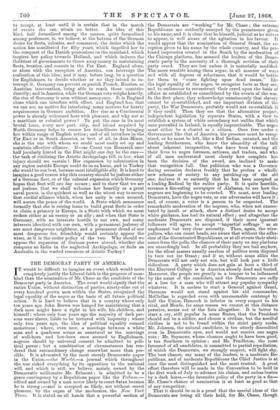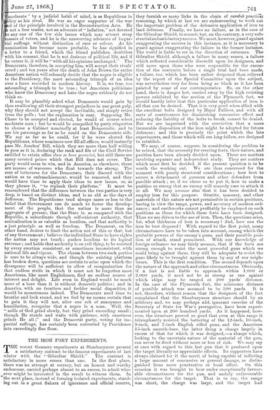THE DEMOCRAT PARTY IN AMERICA.
IT would be difficult to imagine an event which would more completely justify the Liberal faith in the progress of man- kind than the nomination of Mr. Chase as the candidate of the Democrat party in America. The event would signify that the entire Union, without distinction of parties, ninety-nine out of every hundred grown men within the States, recognized the legal equality of the negro as the basis of all future political action. It is hard to believe that in a country where only ten years ago John Brown was hanged for maintaining that a dark man might have a right to his wife, his children, and himself ; where only four years ago the majority of dark per- sons were slaves, liable to be tortured with impunity ; where only two years ago, the idea of political equality seemed monstrous ; where, even now, a marriage between a white man and a quadroon seems as unnatural as the marriage of well-born and low-born once seemed to Englishmen, negroes should by universal consent be admitted to poli- tical power ; but a combination of circumstances has ren- dered that extraordinary change somewhat more than pos- sible. It is advocated by the most sternly Democratic paper in the Union,—the World,—a journal which throughout the war risked everything by its opposition to the national will, and which is still, we believe, mainly owned by the Democratic millionaire Mr. Belmont ; is admitted to be a grave contingency by a Republican paper like the Tribune,— edited and owned by a man never likely to court Satan because he is strong ;—and is accepted as likely, not without secret pleasure, by the organ of the moderates, the New York Times. It is stated on all hands that a powerful section of the Democrats are "working " for Mr. Chase ; the extreme Republicans are evidently annoyed by the prominence given to his name, and it is clear that he himself, judicial as he strives to appear, is well aware of the agitation in his favour. It would appear that the nomination of General Grant, the re- ception given to his name by the whole country, and the pro- found impression created in the South by the moderation of the Chicago platform, has aroused the leaders of the Demo- cratic party to the necessity of a thorough revision of their party creed. They are lost unless it is materially modified. The more sensible among them argue, in all manner of ways and with all degrees of reluctance, that it would be better for them to "cease fighting upon dead issues," like the legal equality of the negro, to recognize facts as they are, and to endeavour to reconstruct their creed upon the basis of affairs as established or consolidated by the events of the war. In the first place, they acknowledge unanimously that slavery cannot be re-established, and one important division of the party, the War Democrats, probably would not re-establish it if they could. Then they see that the alternative project, independent legislation by separate States, with a view to establish a system of white ascendancy not unlike that which once prevailed in Ireland, is equally impracticable. The negro must either be a chattel or a citizen. Once free under a Government like that of America, his presence must be recog- nized, or he must be left, like a Red Indian, untaxed, and the leading Southerners, who know the absurdity of the talk about inherent incapacities, who have been trusting all their lives to negro foremen, artizans, and traders, and who of all men understand most clearly how complete has been the decision of the sword, are inclined to make that recognition full. One politician who was a Governor during secession declares frankly that he prefers a wholly new scheme of society to any patching-up of the old one, declares it so earnestly that he has been accepted as a leading Radical by the entire party. It is quite horrible, screams a fire-eating newspaper of Alabama, to see how the negroes are beginning to be courted. We must, aver leading Democrats, have the negro vote, or our adversaries will have it ; and, of course, a voter is a person to be respected. The remarkable moderation of the negroes, who, when not exacer- bated by insult or attack, show a distinct desire to accept white guidance, has had its natural effect ; and altogether the moderate Democrats are disposed, if their more ignorant followers will agree, to accept " impartial suffrage " as an unpleasant but very clear necessity. Then, again, the wire- pullers, who can count heads, are aware that without the adhe- sion of the discontented Republicans, or at all events their absti- nence from the polls, the chances of their party on any platform are exceedingly bad. In all probability they are bad anyhow, for the silent masses usually careless of politics seem disposed to turn out for Grant ; and if so, without some allies the Democrats will not only not win, but will look just a little ridiculous. A party which does not gain at least a third of the Electoral College is in America already dead and buried. Moreover, the people are greatly in a temper to be influenced by the name of the candidate, and the Democrats are sadly at a loss for a man who will attract any popular sympathy whatever. It is useless to start a General against Grant, Sherman would not stand against his old commander, McClellan is regarded even with unreasonable contempt by half the Union, Hancock is inferior in every respect to his rival, and Meade, for some reason we cannot at this distance perceive, seems out of the lists altogether. It is better to start a cry, still popular in some States, that the President should not be a soldier, and choose a civilian, but the needful civilian is not to be found within the strict party ranks. Mr. Johnson, the natural candidate, is too utterly discredited even in Democratic eyes, and would not receive one negro vote ; Mr. Seymour, whose chances ought to have been good, is too Southern in opinion ; and Mr. Pendleton, the most favoured of all candidates, is committed to partial repudiation, of which the Democrats, we strongly suspect, will fight shy. The best chance, say many of the leaders, is a moderate Re- publican, and of moderate Republicans the Chief Justice is at once the most distinguished and the most trusted. A great effort therefore will be made in the Convention to be held in the first week of July to advance his claims, and unless beaten by a dark horse,—the favourite policy of the party in a fix— Mr. Chase's chance of nomination is at least as good as that of any competitor.
That it should be so is a proof that the special ideas of the Democrats are losing all their hold, for Mr. Chase, though oderate " by a judicial habit of mind, is as Republican in licy as his rival. He was an eager supporter of the war d of the principle involved in the Reconstruction Acts. He not a free trader, not an advocate of " inflation," not devoted any one of the few side issues which may attract stray asses of voters, and he is the unswerving advocate of impar- ' suffrage without distinction of race or colour. As his nomination has become more probable, be has signified in a letter to a friend, which the friend publishes, doubtless with his consent, that he is not desirous of political life, and if he enters it, it will be " with all his opinions unchanged." The Democrats, therefore, in accepting him, will accept their rivals' creed ; and ten years after the death of John Brown the entire American nation will solemnly decide that the negro is eligible to the Presidency, the most astounding triumph of an idea over a force recorded in modern history. It is, we fear, too astounding a triumph to be true ; but American politicians who know the Democracy and hate the negro evidently do not think so.
It may be plausibly asked what Democrats would gain by thus swallowing all their strongest prejudices in one great gulp, why they should not accept the inevitable, and simply retire from the polls ; but the explanation is easy. Supposing Mr. Chase to be accepted and elected, he would of course select moderate men ; but he would be compelled by party etiquettes to choose a Cabinet nominally at least Democratic, and to use his patronage as far as he could on the Democratic side. We say as far as he could, for if he were elected the Republicans, whose nominees now fill all offices, would instantly pass Mr. Jenckes' Bill, which they are more than half willing to pass as it is, declaring the rank and file of the Civil Service entitled to retain office dum se bene gesserint, but still there are many coveted prizes which that Bill does not cover. The party would seem to win, and in America, as elsewhere, there are masses of waverers who float towards the strong. The root of bitterness for the Democrats, their discord with the nation as to enfranchisement, would be removed, and they would have time to apply their ideas to new issues, or, as they phrase it, " to replank their platform." It must be remembered that the difference between the two parties is very deep, is based on distinct ideas, and is as old as the days of Jefferson. The Republicans tend always more or less to the belief that Government can do much to foster the develop- ment of the people, that the nation is more than an aggregate of persons, that the State is, as compared with the Republic, a subordinate though self-existent authority, that centralization is as valuable as localism, and that authority is a just principle as well as freedom. The Democrat, on the other hand, desires to limit the action not of this or that, but of any Government ; believes the individual State to have rights the nation may not touch ; pushes localism to its logical extreme ; and holds that authority is an evil thing, to be resisted by every exertion consistent, or sometimes inconsistent, with national life and vigour. The chasm between two such parties is sure to be always wide, and though the existing platform has broken down, questions are certain to arise upon which the divergence will be sufficient to allow of reorganization for that endless strife in which it must not be forgotten most Americans, like most Englishmen, find an endless source of interest and delight. Life even in England would be much more of a bore than it is without domestic politics ; and in America, with no frontiers and feebler social disparities, it would be monotonous indeed. The Democrats need time to breathe and look round, and we feel by no means certain that to gain it they will not, after one sob of annoyance and humiliation, recognize that a negro is a man. Well, the " mills of God grind slowly, but they grind exceeding small ; though He stands and waits with patience, with exactness grinds He all ;" and the Democrat party, voting for im- partial suffrage, has certainly been converted by Providence into exceedingly fine flour.































 Previous page
Previous page